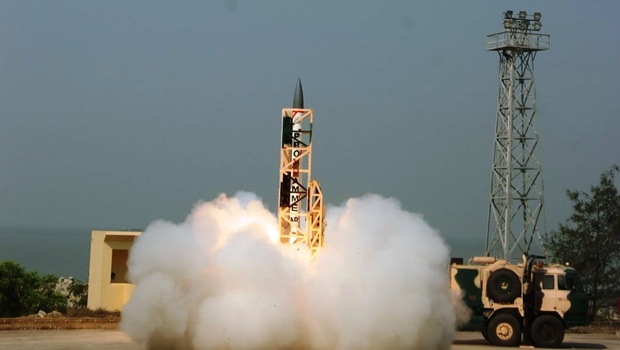Pakistan Reacts To India's Successful Missile Test

NEW DELHI: Radio Pakistan reports that the country’s Advisor to the Prime Minister on Foreign Affairs Sartaj Aziz, in an apparent response to India’s supersonic interceptor missile test, said that Pakistan would address the development at an international level.
Aziz said that the test -- conducted successfully on Sunday -- will disturb the balance of power in the region, adding that Pakistan will continue to upgrade its own defence capabilities. Aziz reportedly added that India now enjoys the support of Washington as the latter thinks a strong India is vital to containing China. “The Advisor said Pakistan will raise its voice at the international level against these developments,” Radio Pakistan reported.
On Sunday, India successfully test fired an indigenously developed supersonic interceptor missile, capable of destroying any incoming ballistic missile, from a range off the coast of Odisha. “The test conducted to validate various parameters of the interceptor in flight mode has been successful,” Defence Research Development Organisation (DRDO) sources said.
The test made it to the top of Pakistan’s Dawn Newspaper’s website.“The target missile was launched at about 11:15am and the interceptor, an Advanced Air Defence missile positioned on the Abdul Kalam island (Wheeler Island), roared through its trajectory to destroy the “hostile missile” in mid-air after getting signals from tracking radars, the sources said,” the report in Dawn -- by arrangement with the Times of India -- notes.
The successful testing of the missile is in line with India’s plans to develop a full fledged multi-layer Ballistic Missile Defence system. According to a PTI report (also picked up by Dawn), “The ‘kill’ effect of the interceptor was ascertained by analysing data from multiple tracking sources,” a DRDO scientist said. The interceptor is a 7.5-meter long single stage solid rocket propelled guided missile equipped with a navigation system, a hi-tech computer and an electromechanical activator, the DRDO sources said. The interceptor missile had its own mobile launcher, secure data link for interception, independent tracking and homing capabilities and sophisticated radars, the DRDO sources added.”
The missile test received a lot of attention on social media:
The tests come as relations between India and Pakistan remain tense, with Pakistan’s relations with it strongest ally -- the United States -- also being dealt a blow. A few days ago, Aziz, whilst pointing out that US-Pakistan relations had taken an "upward trajectory" since 2013, Aziz said the trend had changed due to recent events. "In the past three months, however, this upward trajectory in relations has witnessed a downward slide, as reflected in a decision of the US Congress to block partial funding for eight F-16 aircraft," Aziz said in parliament, referring to the US’ decision to not fund the purchase of eight Lockheed Martin Corp F-16 fighter jets by Pakistan, asking Pakistan to use its own resources instead.
"We have also rejected frequent demands, especially by the US Congress, for the release of Dr Shakil Afridi. The US officials, Congress, think-tanks and media, in tandem with our adversaries, have also been blaming Pakistan for supporting the Haqqani network without giving any concrete evidence to enable us to take additional action against it or other terrorist organisations," Aziz said.
The advisor also hit out at the "Indian lobby in the U.S." -- saying that it had been attempting to further strain ties and block the fighter-jets sale, especially as Indo-Pak relations deteriorated after the Pathankot terror attack in January. "The Indian lobby has been making untiring efforts to reverse the US decision, and a strong attempt, through Senator Rand Paul's resolution, to block the sale itself," Aziz reportedly said.
Several lawmakers had blocked the deal, claiming that Pakistan would use the jets against India instead of fighting militancy in the region. According to the original plan, Islamabad was to pay $270 million for the purchase of the fighter jets, with the US putting up $430 million. With the opposition to the Obama administration’s original plan, the US asked Pakistan to foot the entire amount.
Pakistan has made no move to do so, indicating instead that F-16 fighter jets could be replaced by JF-17 Thunder jets, which have been developed jointly by China's Aviation Industry Corporation of China and the Pakistan Aeronautical Complex.



